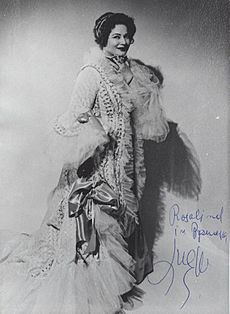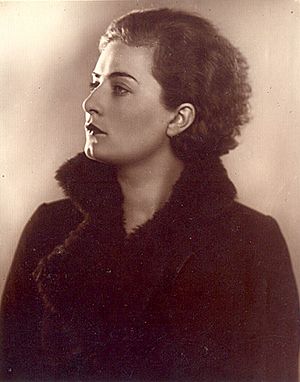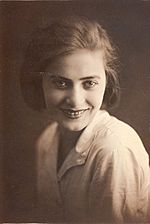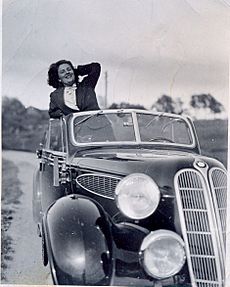Ljuba Welitsch facts for kids
Ljuba Welitsch (born Ljuba Veličkova; 10 July 1913 – 1 September 1996) was a famous soprano opera singer. She was born in Borisovo, Bulgaria. She studied music in Sofia and Vienna. In the late 1930s and early 1940s, she sang in opera houses in Austria and Germany. She became an Austrian citizen in 1946.
Welitsch became very well known for her role as Salome in Richard Strauss's opera Salome. The composer himself, Richard Strauss, helped her prepare for this role. Her international singing career was quite short. It started later because of World War II and ended sooner due to voice problems. Her big international career began in London in 1947 and continued in New York from 1949. By the mid-1950s, her main starring days were over. She sang before it was common to make full studio recordings of operas. So, even though some live recordings exist, there aren't many recordings of her singing.
From the mid-1950s, Welitsch sang smaller "character" roles in operas and acted in plays. She passed away in Vienna when she was 83 years old.
Contents
Life and Career of a Star Singer
Early Life and Training
Ljuba Welitsch was born in Borissovo, Bulgaria. She grew up on her family's farm with her two sisters. Her love for music started when she was very young. When she was eight, one of her sisters gave her a violin. For a while, she thought about becoming a professional violin player. After finishing high school, she studied philosophy at Sofia University and earned a PhD. In Sofia, she sang in choirs and studied music with Georgi Zlatev-Cherkin. With help from the Bulgarian government, she moved to Vienna. There, she studied singing with Theo Lierhammer, a professor at the State Academy.
Welitsch first sang in an opera in Sofia in 1936. It was a small part in the opera Louise. Her first big role was Nedda in Pagliacci at the Graz Opera in the same year. She spent the next three years learning and improving her skills with the Graz company. She sang many different soprano roles in operas by composers like Mozart, Wagner, Puccini, and Richard Strauss.
Between 1941 and 1946, during and after World War II, she was part of opera companies in Hamburg, Munich, and Berlin. While in Berlin, she played the young Composer in Richard Strauss's opera Ariadne auf Naxos. Strauss saw her and was very impressed. He arranged for her to sing the main role in a new show of his opera Salome in Vienna in 1944. This was to celebrate his 80th birthday. He helped her prepare for the role, and it became the one she was most famous for. They worked together on the opera for six weeks, and Strauss came to every rehearsal.
Welitsch became an Austrian citizen in 1946. She was a very important singer for Franz Salmhofer, the opera manager. He was working to rebuild the Vienna State Opera company after the war. In Vienna, she learned even more roles in French, German, Italian, and Russian operas. Besides Salome, she was also known for her roles as Cio-Cio-San in Madama Butterfly and Donna Anna in Don Giovanni.
Becoming an International Star
In 1947, Salmhofer took the Vienna State Opera company to London. Welitsch was already somewhat known in Britain from singing in concerts. But her performances in the opera house created a huge buzz. At Covent Garden, she sang Donna Anna and Salome. She was so amazing that she overshadowed other singers. The Grove Dictionary of Music and Musicians said she "dazzled London audiences" with her powerful and pure singing. While in London, Welitsch also sang in two radio shows of Strauss's Elektra. The composer himself was there to hear her.
David Webster, who directed the Royal Opera House, saw how talented Welitsch was. He hired her to sing with their company from 1948 to 1953. She appeared in operas like Aida, La bohème, Salome, Tosca, and The Queen of Spades. In London, operas were usually sung in English back then. So, Welitsch, like other German singers, had to learn her parts in English. When she sang Musetta in La bohème, The Times newspaper said she often sang better than the main singer. In 1948, she sang Donna Anna for the Glyndebourne Festival Opera at the Edinburgh Festival. A critic wrote that she was like a "tiger" on stage. That same year, she sang in Beethoven's Ninth Symphony with the Vienna Philharmonic. In 1949, she sang Amelia in Un ballo in maschera at the Edinburgh Festival.

Also in 1949, Welitsch made her first appearance at the Metropolitan Opera in New York. She sang Salome. A critic named Irving Kolodin said that no one else could match her singing and acting as Salome. Variety magazine praised her singing and acting. They also talked about her famous "Dance of the Seven Veils" in Salome. They said her dance was so energetic that it made the audience gasp!
At the Metropolitan Opera, Welitsch sang the same roles she was famous for in London. She also added Rosalinde in Die Fledermaus. Later in her career, she returned to the Met to play a non-singing role, the Duchess of Crakentorp, in La fille du régiment in 1972.
Welitsch's international career mostly focused on Vienna, London, and New York. She also continued to perform in Graz. She was asked to sing at La Scala in Milan twice, but she was too busy to accept.
Later Years and Acting Career
By 1953, Welitsch started having voice problems. This, along with singing in so many shows, caused her voice to get worse quickly. She had to stop singing the main roles she was famous for. She had hoped for a longer career and even thought about singing Isolde in a few years. The critic Tim Ashley wrote that Welitsch's last time as Salome was in the 1955 movie The Man Between. In a scene set in the Berlin State Opera, you can see her from a distance performing the opera.
Welitsch could still sing roles like Magda in Puccini's La rondine in Vienna in 1955. She also recorded the character part of Marianne in a 1956 recording of Der Rosenkavalier. She successfully started acting in plays, such as June in a German version of The Killing of Sister George in Berlin in 1970.
Even after she stopped singing, other musicians and people in the opera world admired her. The record producer John Culshaw wrote in 1967 that she was a welcome guest at recording sessions. He even mentioned that bringing her kippers (a type of fish) to Vienna was a regular task! She was known for her kindness and continued to be a public figure, often attending opening nights at the opera.
Welitsch was married and divorced twice. She did not have any children. She passed away in Vienna after several strokes, at the age of 83.
How People Remember Her
Many people in the music world praised Ljuba Welitsch. The soprano Leontyne Price said that seeing Welitsch perform Salome made her want to become an opera singer herself. In a book called Dictionary of Opera Characters, Joyce Bourne wrote that among many famous Salome singers, Ljuba Welitsch was "probably the most famous."
Recordings of Ljuba Welitsch
Welitsch's international career ended around the time when long-playing records became popular. These records allowed for full operas to be recorded. However, Welitsch retired too early to be a big part of this new trend. Her only studio recording of a complete opera was Die Fledermaus, recorded in 1950 and 1951.
There were plans to record a full studio version of Salome, but it didn't happen due to lack of money. However, some live recordings of Welitsch singing Salome from 1949 and 1952 have been released. People generally agree that her performance in the 1949 recording was better. There are also recordings of just the final scene of Salome.
Other live recordings of full operas with Welitsch include Elektra (1947), Un ballo in maschera (1949), and Aida (1949 and 1950). A live recording of Don Giovanni from the Salzburg Festival in 1950 has also been released.
Welitsch also sang the role of Marianne in two complete recordings of Der Rosenkavalier.
Other Recordings
In 1946, the recording producer Walter Legge signed Welitsch to record for EMI. For the EMI Columbia label, she recorded famous songs from operas. These included songs from Eugene Onegin, Aida, Tosca, La bohème, and Der Freischütz.
With the Metropolitan Opera orchestra, Welitsch also made studio recordings of songs from Don Giovanni, Die Fledermaus, The Gypsy Baron, and Tosca in 1949 and 1950.
In June 1950, Welitsch recorded eight songs by composers like Lehár, Tchaikovsky, Verdi, and Millöcker for Decca.
Some recordings of German songs that Welitsch made in New York were not released at the time. However, they have since been put out on CD. These include songs by Richard Strauss, Mahler, Schubert, Schumann, and Brahms.
Filmography
| Year | Title | Role |
|---|---|---|
| 1953 | The Man Between | Salome |
| 1958 | Trees Are Blooming in Vienna | Singer |
| 1958 | Arms and the Man | Katharina |
| 1959 | Arena of Fear | Mama Allison |
| 1959 | Liebe auf krummen Beinen | Trudchen |
| 1959 | La Paloma | Bette Maier |
| 1959 | Labyrinth | Ljubas |
| 1959 | Du bist wunderbar | Yvonne Lehmann |
| 1959 | My Niece Doesn't Do That | Opera Singer (Walküre) |
| 1960 | Final Accord | Louise |
| 1961 | Beloved Impostor | Ceila Shadwell, Syrup Millionairess |
| 1962 | Eheinstitut Aurora | Mrs. Pearl |
| 1962 | Adorable Julia | Dolly de Fries |
| 1962 | Das haben die Mädchen gern | Viktoria Petit-Pierre |
| 1963 | Charley's Aunt | Baroness |
| 1964 | I Learned It from Father | Manageress Neumann |
| 1968 | Paradies der flotten Sünder | Baroness |
| 1974 | Eine Nacht in Venedig | Agricola |
| 1975 | Ein echter Hausfrauenfreund | Hotel Manager |
| 1976 | The Mimosa Wants to Blossom Too | Lady Shots (final film role) |
See also
 In Spanish: Ljuba Welitsch para niños
In Spanish: Ljuba Welitsch para niños




